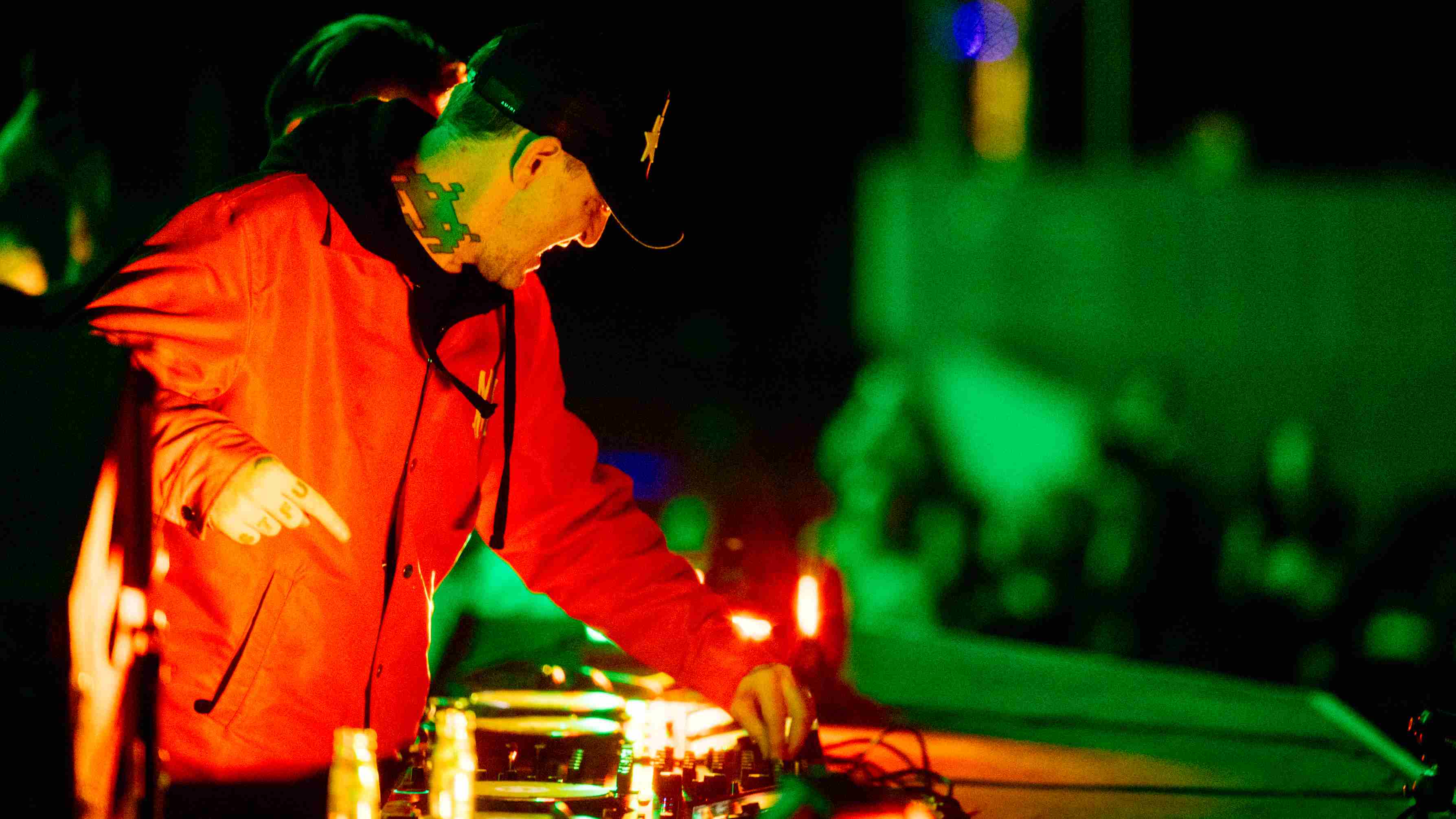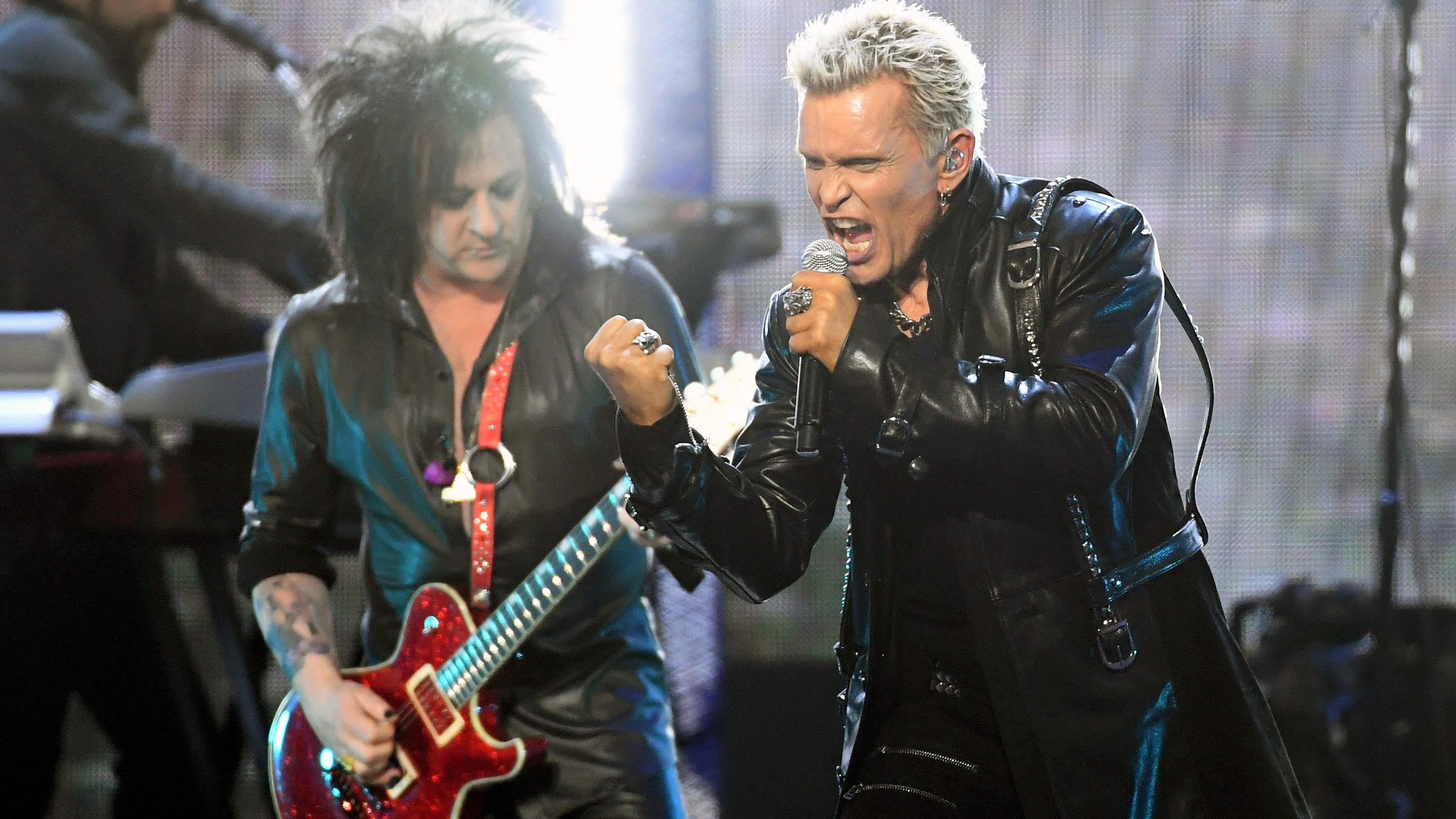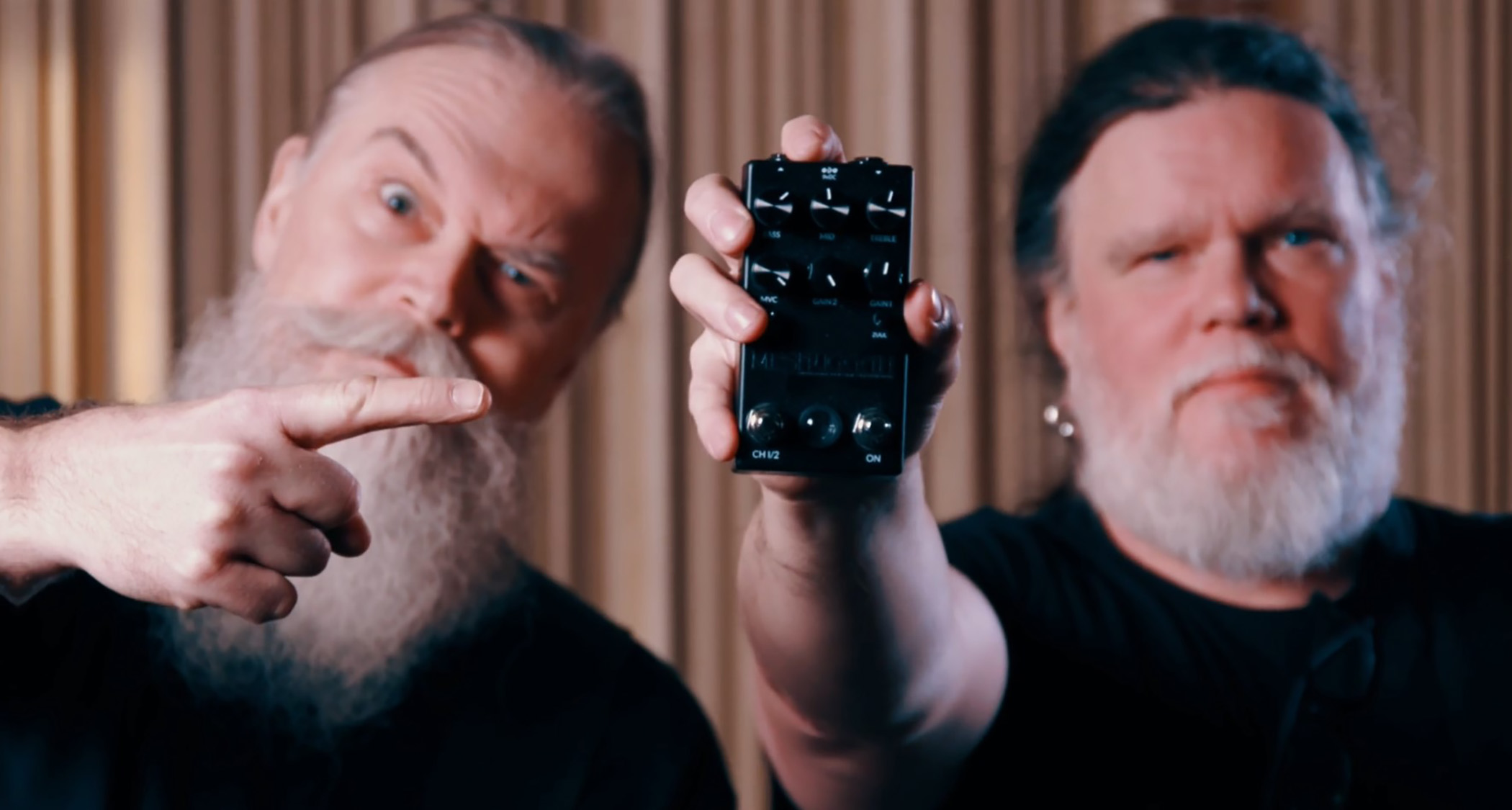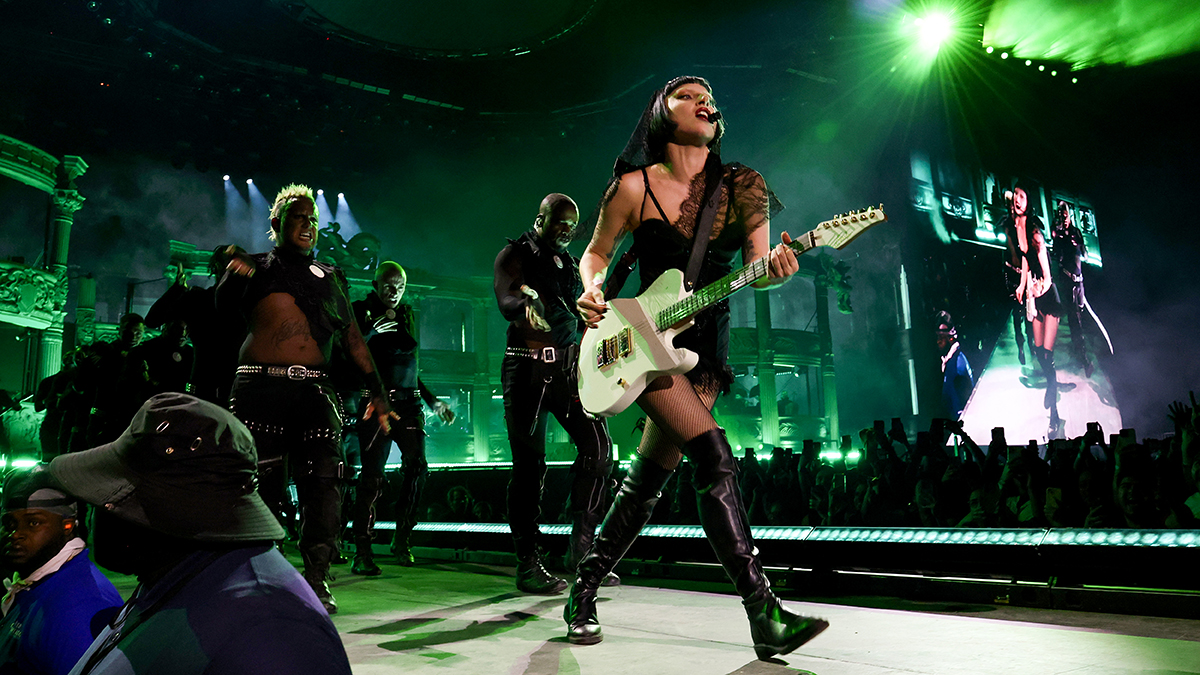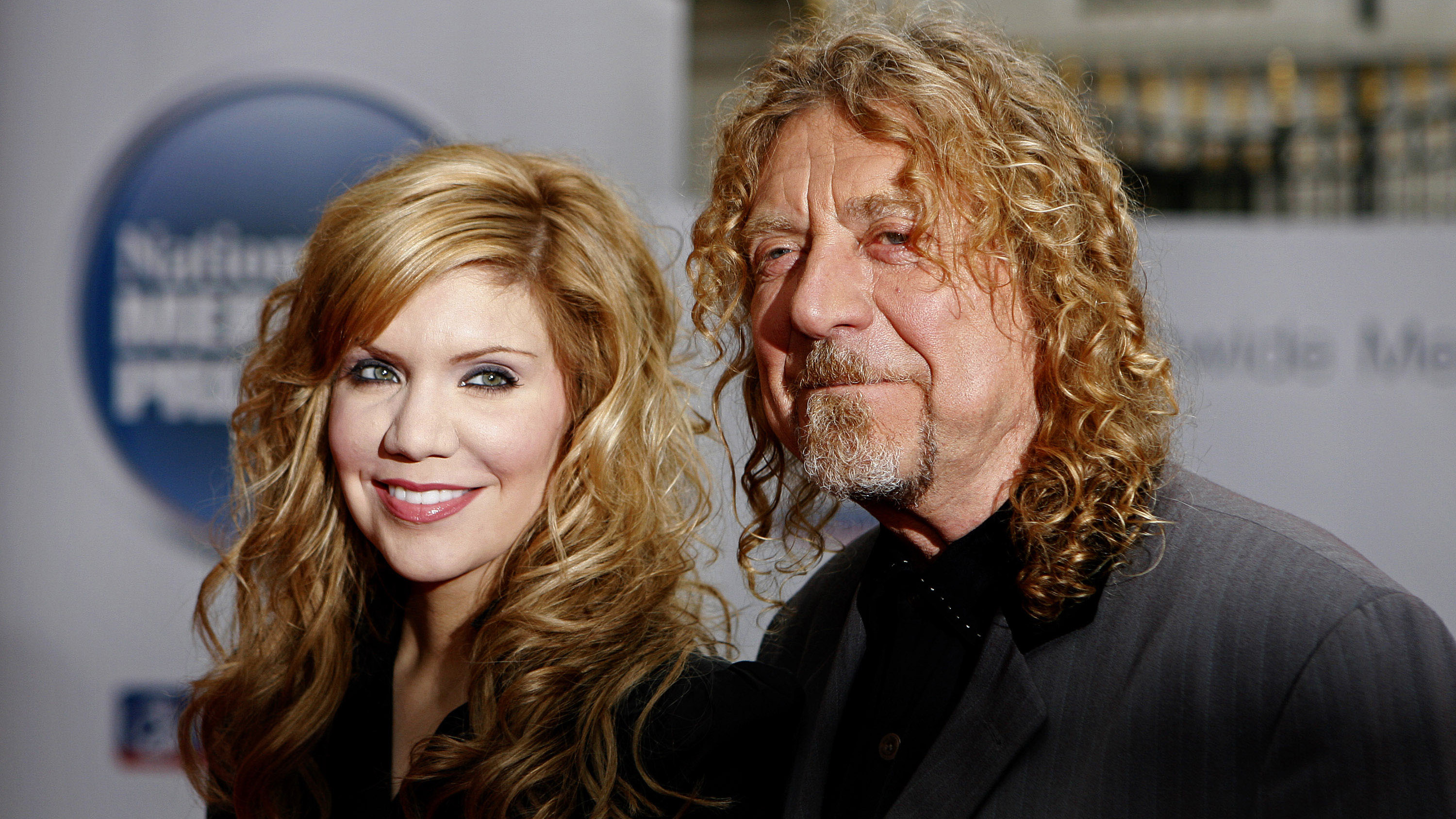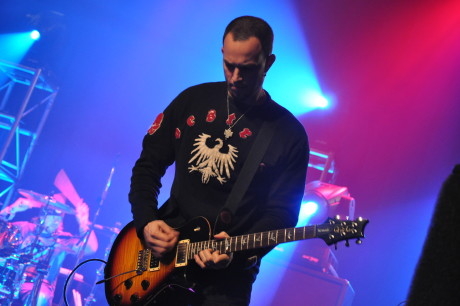
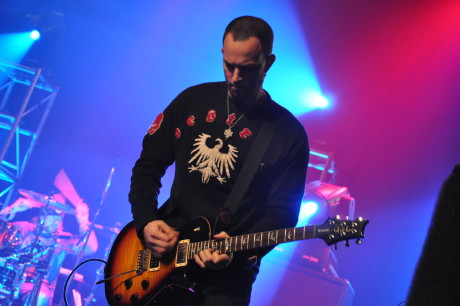
Back in issue 324 we spoke to Creed and Alter Bridge guitarist and Mark Tremonti, but as you'd expect with such a talented and versatile player, we just couldn't squeeze all his pearls of wisdom into the mag, so here it is, the complete Guitarist interview - uncut.
For Alter Bridge fans, the Creed reunion was a bit of a surprise - at what point did you decide it would be more than just a summer US tour and you'd make a new studio album too?
Mark Tremonti: "When we first met up it was to talk about the summer tour in the States. Then after spending a little time together in the weeks after our first meeting, we decided to record a new album as well. But the tour had already been scheduled, giving us only two and a half months to write a record - so we put ourselves under the gun."
That sounds like quite a challenge, did you already have a stockpile of material?
"I'm always writing, so there's always stuff ready to go. After all these years of writing for Alter Bridge, the biggest challenge was not sounding like Creed, so I stored away a lot of ideas that I'd written just so it didn't sound like Creed. It stemmed more from Alter Bridge having that different sound, but those ideas were still there. I still enjoyed them, I just didn't know what I was going to do with some of them. I'm glad it that it worked out. Now going back to Creed there's a bunch of ideas just waiting."
It feels like the theme of Full Circle is redemption with Scott [Stapp, singer] being pretty honest about the last few years...
"There's definitely themes on the album and one is Scott asking people to give him another chance because he knows he's made some mistakes in the past. He wants to get out there and prove himself - overcome the past."
Get the MusicRadar Newsletter
Want all the hottest music and gear news, reviews, deals, features and more, direct to your inbox? Sign up here.
How surprised was Scott at the huge development you'd made as a guitar player in the years you'd been apart?
"He was very complementary to everybody. He told us he's worked with a lot of musicians in the meantime, that it was tough for him, and that getting back with us is easy for him to work - it all seems natural. The four of us cut together as musicians so getting back together was actually very easy."
So do you feel more at peace now you have that friendship again like the beginning?
"Yes, Scott's definitely changed - we've all changed from back in the day. Eveybody's been acting like gentlemen and adults. We've all got our kids and families out with us and it's just a nice peaceful time. This tour's been good for everybody."
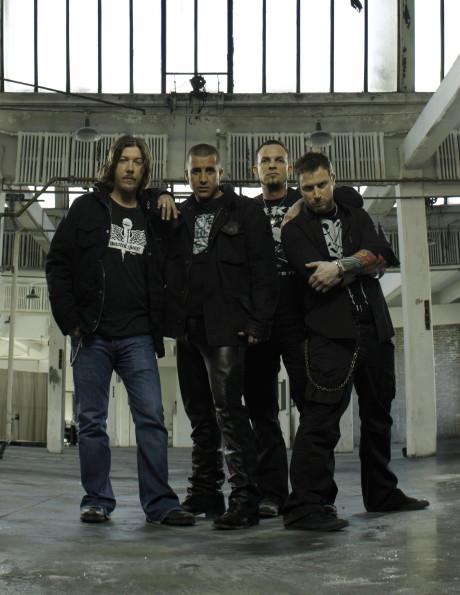
In Alter Bridge, your guitar solos tend to be more of a centrepiece. There are solos on Full Circle, but they tend to be less central in the arrangements. Was this a conscious decision?
"With this I didn't spend a lot of time getting into the lead world. When we do an Alter Bridge record I'll spend a month or so just playing lead and learning as much as I can so I can assimilate it into my playing right before I track the solos, so I get inspired. With this record it was so fast I didn't have time to do that. Plus I'd like Alter Bridge to be more on the progressive side of things and for this to be more of an easily digestible straightforward rock 'n' roll record."
Did you use any new gear for recording?
"I bought a Fender Tone Master that used to belong to [former Black Crowes and Cry Of Love guitarist] Audley Freed. I went into a Guitar Center and they had one of the amps he recorded the Cry Of Love records with. He's one of my favourite guitar players, so I bought it in a heartbeat. I brought that to the studio and it was incredible - everybody loved it. So I layered my normal tone, which is the [Mesa/Boogie] Rectifier and Bogner Uberschall, with the Tone Master. For the heavier tunes I'd also track with the Diezel Herbert, because nothing sounds heavier than that thing in the studio."
Bread Of Shame has one of the heaviest tones we've heard from you, but it's full of cutting clarity too, so do you have the Herbert to thank for that?
"That was Diezel for all the super chunky low-end, but still tight with the other two amps. I'm not sure if the Tone Master made it on that track. We experimented elsewhere too - they had a good 15-20 amps in the studio before I got there and I brought around eight myself. With every song we would say, I'm feeling this vibe or that vibe and we'd put about three amps together for the tone of that song. I brought my Bogners - including my Shiva and Ecstasy, my two favourite Rectifiers and my Two-Rock for the lead stuff - that's a great amp that I use live and in the studio. But the amp that I used from the studio regularly was the Marshall Major. Now, I'm not a big Marshall fan - I've only tracked a few times with an old Plexi in the past - but the Major really added to the tone of certain songs."
There's plenty of your trademark arpeggiated clean work too - did you change your approach in any way for that?
"When we did acoustics I tried something new. I'd never used it before, but they had a guitar in Nashville tuning. I doubled the acoustic guitars with it. It's great - I'd never have thought to use all the thin strings from a set of 12 and it always sounded really good for doubling."
What other tunings were you using?
"On the song Time I used an Open G tuning. But it's different to the Open G tuning I've used previously; I tuned the high string down so it's Open G minor. I just kind of stumbled upon that tuning and wrote a bunch of ideas with it - it turned out to be my favourite song on the record."
You're playing some interesting harmonics on that song too...
"That was the thing that really opened up for me in that tuning - the placement of all the harmonics. You could really create a melody on the guitar and let the natural harmonics fly in that tuning."
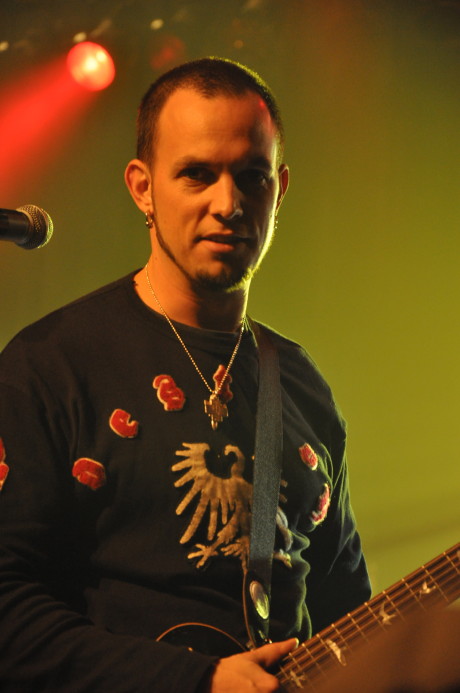
As well as your signature models, we know you've been putting a new PRS 305 model with the three single-coils through its paces, did you use it at all on Full Circle?
"I used that for a lot of the clean tracking on the record - it's such a pure sound. It's almost Strat-sounding in a way, but it's a little different, a little warmer sounding than a Strat. I did a couple of little parts with a Strat too, but the 305 really is a beautiful guitar."
While we're on the subject of PRS, are there any future plans for your range of PRS signature models?
"I think we've got it down to where it needs to be, we added the bar but I call PRS all the time and tell them how much I enjoy the first run of the guitar. Even as much as the new one. With the fixed bridge it's a workhorse - but both are great, with a different feel from another. Between the two guitars I've got everything I'm looking for."
Are you using any new effects in your rig since the last time we talked with you?
"On tour now I have the phaser pedal that T-Rex did [a Tremonti signature]. I stumbled upon T-Rex when I was in Rudy's in New York. I was looking for a delay pedal and he told me the T-Rex was the greatest delay pedal out there. I tried it and loved it. Then Michael Angelo Batio - a good buddy of mine - came to our show and brought his [T-Rex signature] overdrive pedal. He had me try it out for soundcheck and afterwards I told him he wasn't getting it back!
"Once I tried those two pedals and saw how great they were that was it. His overdrive pedal is like a TS-9 but perfect - just warm and rich, saturated. I asked him if [T-Rex] did endorsements - whether I could give them quotes or have pictures taken and get their whole line of pedals. Then I got in contact with T-Rex and they offered to do a signature pedal. At the time I told them there wasn't really a lot I used onstage - other than delay. But the only other effect I use is a pasher. I was using a [MXR] Phase 90 to spice up songs here and there. So we put out a phaser pedal. It's a real ultra dynamic phaser. Now when I play leads live I'll often use it."
The song On My Sleeve has an interesting mix of an acoustic verse part with a huge orchestra-backed chorus - did it start as an acoustic idea?
"Yes, it started with a little guitar line and I had put a bunch of harmonics in it. You can hear them in the beginning and then I cut them out. When I first wrote it I thought it was cool, but repeated too many times it became redundant. So I kept it as an arpeggiated clean line and then we threw the chorus together when the band met up and began piecing the song together, singing harmonies together. With the bridge, when we come up with a song that has a verse and a chorus I'll just jump on my computer, pull out my bridge ideas and throw them out to the band and wait until one of them sticks. And everybody dug that bridge."
So you stockpile ideas into categories?
"When I write it's individual ideas. Sometimes it's two ideas together, but most of the time I'll catalogue them and categorise them under bridge, chorus, verse or riff - whatever. So when I have a song that's missing a part I'll go in and check through to see which one fits - whether it's in 6/8 or 4/4."
Your backing vocals on Full Circle are much more prominent than they've ever been in the past. Especially on the song A Thousand Faces - is that something you've been wanting to do more of?
"I think the A Thousand Faces part was something I had in mind when I brought that it so once Scott started singing the alternate part I just sang the part I had before and it fitted. It's something we've done before - such as the song My Own Prison - with the two parts. We had that going in a few other songs but my vocals are mixed down so it's not as clear. Same with Full Circle and incorporating the two vocal melodies."
It really sounds like Creed have picked up where they left off with this album in some ways but obviously reflects the marked development in your musicianship, was that a challenge?
"Thank you. With all the experience we've had over the last six years with Alter Bridge we've learned a lot. We've put it towards this new Creed record. If a lot of people who weren't aware of Alter Bridge heard this record after Weathered I'm sure they'd hear a huge difference. For us, we've experienced these six years and it's just the way we sound now. We've developed new styles and we also wanted Creed to have a facelift in sound. We didn't want to just come back and do the same thing. We wanted to shock people a little - and not let people think we were coming back to throw a record together and get out. We wanted people to know we worked really hard on the record and we did - we only had two and a half months and we spent all day and night on this album until it was done."
So at the end of the first phase of the reunion tour - how do you feel about things so far?
"The tour's been great. It doesn't feel like the ending for me now because we have so much still to do and we're going to be so busy moving forward. It's been great, the shows have been really fun."
And you've added Eric Friedman as a second guitar player when Creed perform live, which is a first for the band - what prompted that decision?
"I met Eric about 10 years ago and he's become the little brother I never had. He's pretty much my best friend and we've played guitar together for years. I'm always blown away by how good he is - he's one of those naturally gifted people who can hear something, know exactly what's going on and play it right back to you. And play any style.
"So when Creed got back together, I mentioned to Scott that it would be great if we could incorporate another guitar player, because after doing Alter Bridge all these years I've become so accustomed to playing with another guitarist. And you can do so much more with it. So we've brought Eric into the mix and everyone has just been blown away with how good he is and how much it adds to the band."
And he's also contributing to backing vocals as well...
"He can sing the highest! He's got great pitch, a real talent."
Like you he's playing PRS, but what about amps?
"He's using Bad Cat Hot Cat amps and one of their new amps - I'm not sure of the model. Bad Cats sound great when you have another player with the Mesa/Boogie type of sound - it just embellishes it perfectly."
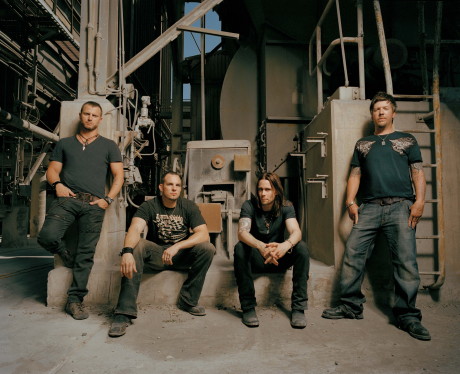
Needless to say we're big Alter Bridge fans at Guitarist and a lot of people probably thought Creed's reunion meant Alter Bridge were over, but you were quick to assure fans that neither band would be negatively affected...
"We're very proud of what we've done in Alter Bridge, we absolutely love it and we're not going to put that in jeopardy at all. We're going to get in there and tackle the next record as best we can, keep things going. Instead of taking four month breaks we're working extra hard to make both things happen."
Do you plan to start work on the third Alter Bridge album this year?
"We've already got about six or seven ideas that we've already started working on. Myles [Kennedy, vocals and guitar] is coming down to my house in Florida at the end of November and we're going to write for about two months, then go into the studio.
"The good thing about technology nowadays is that Myles and I can go onto Skype for a writing session, so we can get a jump start on that. We're planning on going to a studio in late January with Michael Baskette, who did the Blackbird record, then hopefully have the record out next summer."
So do you feel like you're at a creative peak right now - writing for two bands?
"Yes, it's been great. We were working on the next Alter Bridge record then I shifted gears and started working on both bands - that's when I really felt that a lot of ideas were coming out. But then I was getting nervous, I've been on tour with Creed for a few months and I've been trying to continue to write, but we've been so busy. I was kind of nervous about being prepared for the next [Alter Bridge] album, but I went back through a bunch of ideas and organised them, so now I'm feeling really confident about how it's going to turn out."
Creed are back, another Alter Bridge album is coming out next year and Myles is also is working on his own album - your fans have never had it so good...
"When people complain online about the Creed thing happening, they should remember they're getting three records instead of one!"
Do you think that the knock-on effect of Creed's reunion could be a higher profile for Alter Bridge in the US?
"I hope so. We've got the Alter Bridge live DVD for sale at the [Creed] shows, we've also got our albums for sale too. There's just a lot of people that still don't know about Alter Bridge in the States. Even the people working on the tour, all the crew guys. We were halfway through the tour and they had a bus trip and popped the Alter Bridge DVD in and they'd never seen the band before, they told me how much they dug it. I think it's just an exposure thing here."
There's a stigma around Creed that fans of the band will be aware of, maybe because you're a band who became very big and that seems to be par for the course - does it still frustrate you?
"I think I've become more at peace with it - a lot of it's because of Alter Bridge, because Alter Bridge was kind of the opposite for us. It didn't sell millions of records, but it had credibility to it. People gave it praise instead of beating it down. So now we have the best of both worlds - we have a band that sells a lot of records and gets beat up, and then we have a band that gets praised [laughs]."

Rob is the Reviews Editor for GuitarWorld.com and MusicRadar guitars, so spends most of his waking hours (and beyond) thinking about and trying the latest gear while making sure our reviews team is giving you thorough and honest tests of it. He's worked for guitar mags and sites as a writer and editor for nearly 20 years but still winces at the thought of restringing anything with a Floyd Rose.
“It is ingrained with my artwork, an art piece that I had done years ago called Sunburst”: Serj Tankian and the Gibson Custom Shop team up for limited edition signature Foundations Les Paul Modern
“The last thing Billy and I wanted to do was retread and say, ‘Hey, let’s do another Rebel Yell.’ We’ve already done that”: Guitar hero Steve Stevens lifts the lid on the new Billy Idol album



